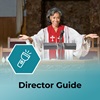- Ask questions that require more than a "yes or no" answer.
- Ask thought provoking questions.
- Ask clear, short questions. Make them concise.
- Don't ask rhetorical questions.
- Don't ask trick questions.
- Don't ask questions that would insult or embarrass someone.
- Move from simple questions to complex.
- Move from general to specific.
- Allow time for persons to respond.
- Don't use questions that have only one answer (What I was really looking for was … ).
- Listen to the answer. Look at the person. Don't be thinking about what you are doing next or looking down at your lesson.
- Acknowledge the response (Thank you for sharing. That's good!).
- Show interest in what the person is saying.
- Give everyone a copy of your questions when you begin the lesson. Use a handout or three by five cards.
- Assign questions to subgroups of four for greater discussion and participation.
- Don't be afraid to say, "I don't know. What do you think?"
- Rephrase the answer "Are you saying … ? ".
- Summarize the discussion.
- Don't be afraid to let a question sit there in silence. Use the pregnant pause.
- Value the contribution of those in your group and they will respond.
Practical Discussion Tips
20 tips that will help keep your discussion moving and fruitful
Related

Create Sermon-Based Bible Studies
How to write engaging group studies that tie into your pastor's sermons

Theological Discussions for Everyone
Get everyone involved in meaningful, fruitful discussions.

Find the Right Study for Your Group
Practical tips so you'll never dread finding a study again






